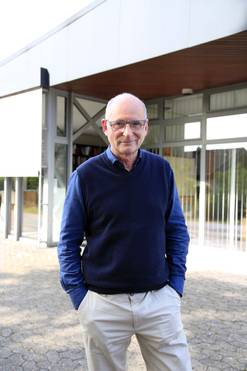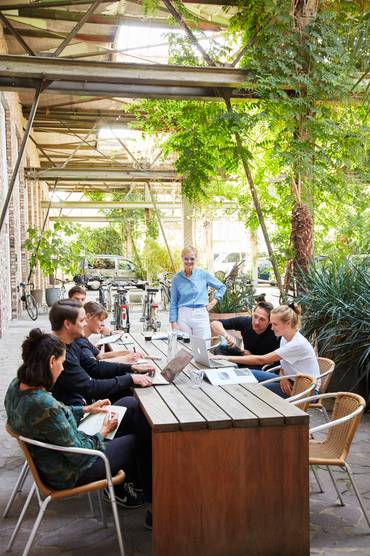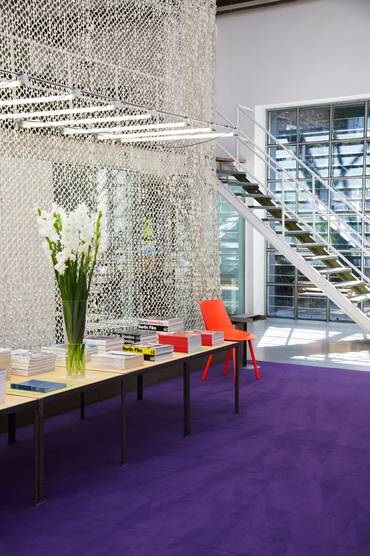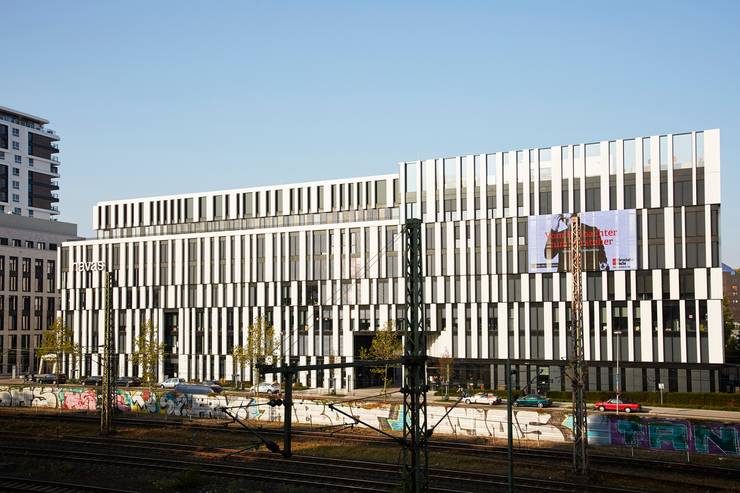Media / NRW
News and views
Reporting on the publishers, broadcasters and producers that make the region a European communications hub.

Christof Kerber, Bielefeld
Christof Kerber, publisher of Kerber Verlag, has led the production of handsome books for emerging artists since 1985, following his assumption of the family printing press in Bielefeld. As one of a handful of German art-book publishers that prints in-house, each of the 100 titles released by the imprint each year is made to different specifications. Kerber tells us more about his business, the industry and the region.
Why are you based in Bielefeld?
We are not a Berlin start-up; we are an established company and this is where we have been for generations. My grandfather started the family printing company here in 1954.
What sort of work do you specialise in?
We work mostly with young international artists who are on their way to becoming famous.
Which local artists and institutions have you worked with?
We recently worked on a book with Markus Oehlen, as well as the Pablo Picasso Art Museum in Münster.
kerberverlag.com
Mike Meiré, co-founder of Meiré & Meiré, Köln
Opened in 1987 by brothers Mike and Marc Meiré, design agency and creative consultancy Meiré & Meiré is an institution in Germany. We sit down with Mike to talk business.


Why work in Köln?
It’s inspiring and draws a global crowd. There are exhibitions and major fairs from furniture to food.
What is NRW’s creative landscape like?
Many artists and designers are based in this region and have helped put Köln on the global art map. More than 200,000 students attend the universities in Köln and Düsseldorf and that shapes the cities.
What about NRW’s art scene?
On one hand you have offbeat spaces like AK Raum; on the other you have recognised galleries such as Daniel Buchholz with a 30-year history.
Your favourite thing about Köln?
It’s not just a city, it’s a mentality.
meireundmeire.com
1.
Funke Mediengruppe, Essen
The Funke Media Group originated in 1948, when Jakob Funke co-founded the Westdeutsche Allgemeine Zeitung (waz). Since then the family business, which opened its new HQ in Essen last year, has grown into one of Germany’s leading newspaper and magazine publishers, with 6,500 staff and an annual turnover of €1.3bn. It specialises in regional publications – including nrw’s waz and Westfalenpost – and has majority stakes in 12 local radio stations, various digital offerings and runs its own printing plants.
funkemedien.de
2.
Bertelsmann, Gütersloh
Among the largest media conglomerates in the world, Bertelsmann’s empire encompasses Penguin Random House publishing, international music publisher-cum-label bmg and rtl TV and radio. The company recorded a total revenue of €18bn last year from its HQ in Gütersloh, with more than 100,000 employees worldwide. And its presence is felt beyond the media world, with it funding start-ups such as the Founders Foundation in Bielefeld (see section 2) and online education initiatives under the Bertelsmann Education Group moniker.
bertelsmann.com
3.
German TV in the region
nrw is Germany’s top TV hub and Köln is the beating heart of the industry. It’s the base of many studios and international production companies, as well as a big draw for TV productions such as Deutschland 83. And what would the cult series Tatort (Scene of the Crime) be without nrw? Köln, Münster and Dortmund are central to Germany’s longest-running drama, airing since 1970.
4.
Handelsblatt Media Group, Düsseldorf

The Handelsblatt Media Group is Germany’s primary source for business and financial reporting. In 2018, the 74-year-old business moved its 1,000 employees into a new office building on Toulouser Allee, renewing its dedication to the state capital and the newspaper industry. With publications such as Handelsblatt and Wirtschaftswoche, as well as the youth news website Orange and specialist media offerings, the group is well positioned to thrive in today’s changing media landscape.
handelsblattgroup.com
Fit to print
Northern nrw packs a punch with its print media offerings. The region’s cornucopia of magazines, newspapers and periodicals is the result of a historic (and contemporary) press industry that is thriving, bolstered by the nearby presence of the headquarters of multinational media empire Bertelsmann in Gütersloh (see facing page). A healthy ecosystem of independent presses – including printer and publishing house Kerber Verlag (see facing page) – help to turn out community magazines.
Newspapers Westfalen-Blatt and Neue Westfälische keep Ostwestfalen-Lippe’s residents in the know, while those in Münsterland might be better served by dipping into local sheets Westfälische Nachrichten and Münstersche Zeitung. Even for print-happy Germany, this swathe of the country is a periodical-lover’s delight.
Public broadcasters
No state in Germany has more listeners than nrw, whose three primary public stations have been broadcasting for more than 50 years. They include Europe’s largest public-service broadcaster wdr, public international broadcaster Deutsche Welle and national public radio broadcaster Deutschlandradio.


